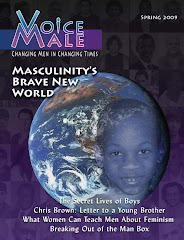by Rob Okun
This opinion piece from a year ago Valentine’s Day speaks about the need to organize a national teach-in on men and masculinity. While it was prompted by the senseless killings of five people by a troubled man perpetrated on a college campus near Chicago, the urgent need for a frank discussion of men—and not just those who are isolated, angry, and alone—can, perhaps, begin. With an administration in Washington more sensitive to these issues than ever before, to coin a phrase, this is our time.. Truth be told, at one time or another many men in our society feel isolated, angry and alone. I am no exception.
Even though it was again a man who went on another campus shooting spree, the national conversation has so far failed to focus on the root causes of this latest lethal outburst: men’s depression and how men are socialized. Until we acknowledge those issues, we can only expect more tragic bloodlettings.
The Valentine’s Day 2008 massacre at Northern Illinois University ended with five dead and 16 wounded before Steven Kazmierczak fatally turned one of his guns on himself. The multiple murders are the latest example of an expression of masculinity society continues to ignore at its peril. While a horrifying tragedy was unfolding on a campus 65 miles from Chicago, troubled men in tiny hamlets and big cities across the U.S. also were experiencing painful emotional episodes that few were paying attention to, including themselves. At organizations like the Men’s Resource Center for Change in Amherst, Massachusetts staff say they meet some of them and wish they could help more.
Men’s violence of the magnitude Kazmierczak perpetuated needs more than news shows inviting the likes of Dr. Phil on for analysis. We need a national teach-in on masculinity attended by doctors, social workers, teachers, clergy, the judiciary, legislators and parents. And the facilitators need to come from the ranks of those of us who have been examining male behavior and working with men and boys for the past 30 years.
The profile of the 27 year-old Kazmierczak follows a familiar pattern — a hospitalization for mental illness, a reticence to talk about his problems, a fascination with guns and, most tellingly, recently ceasing to take his depression medication. That he was in a two-year relationship with a young woman who said she was shocked to discover he had committed such a horrific act only adds to the tragedy of men hiding the secret of their mental anguish, especially from those they love.
The story isn’t about Kazmierczak opening fire at innocent students, as tragic as the loss of lives is. It’s about a society that still doesn’t acknowledge maleness as the singular characteristic tying together virtually every similar act of violence over the past decade. We’ve known it was masculinity since the shootings in Pearl, Mississippi in October, 1997; Jonesboro, Arkansas in March, 1998; Littleton, Colorado in April, 1999; Lancaster County, Pennsylvania in October, 2006; and, 10 months ago, by the slaughter at Virginia Tech. The inconvenient truth is not just that all the assailants have been male but that until we make that fact predominant all the observations the forensic psychologists the news programs trot out are pointless.
The conspiracy of silence about men and depression, men’s reticence to seek counseling, the health care community’s underreporting of the relationship between men’s mental health and a host of related problems — from alcoholism to heart disease—all have to be challenged. This is a campaign the Surgeon General needs to mount with all the resources of the one that changed social attitudes about smoking. The current social agreement about masculinity assumes a minority of men like Kazmierczak are an unavoidable part of male behavior.
Certainly society doesn’t sanction horrific mass killings, but we have compartmentalized these particular aberrant acts as a kind of “boys will be boys gone wild” — not as an endorsement but as an explanation of the inevitable. We can no longer ignore the fact that too many men live lives of quiet desperation—it isn’t just the loner who doesn’t talk with anyone about life’s struggle. Most of us men, at one time or another go underground with our feelings as part of a misguided strategy to better negotiate our lives. In Kazmierczak’s case, his silence—to himself and his girlfriend—proved deadly.
It’s time to draw a new social agreement about masculinity proclaiming we will intervene with moody, shut down, angry males and not just those found on our campuses or in offices and factories. Sadly, they are also on our elementary school playgrounds and walking the corridors of our middle schools.
How many more men must lash out before we acknowledge men’s mental health is as serious a health issue as prostate cancer? Mental health treatment for troubled men must rise to the top of the national agenda if there’s to be any hope of preventing future tragedies. The killings in Illinois may have ended, but the national campaign about the crisis in masculinity has barely begun.
Subscribe to:
Post Comments (Atom)




No comments:
Post a Comment